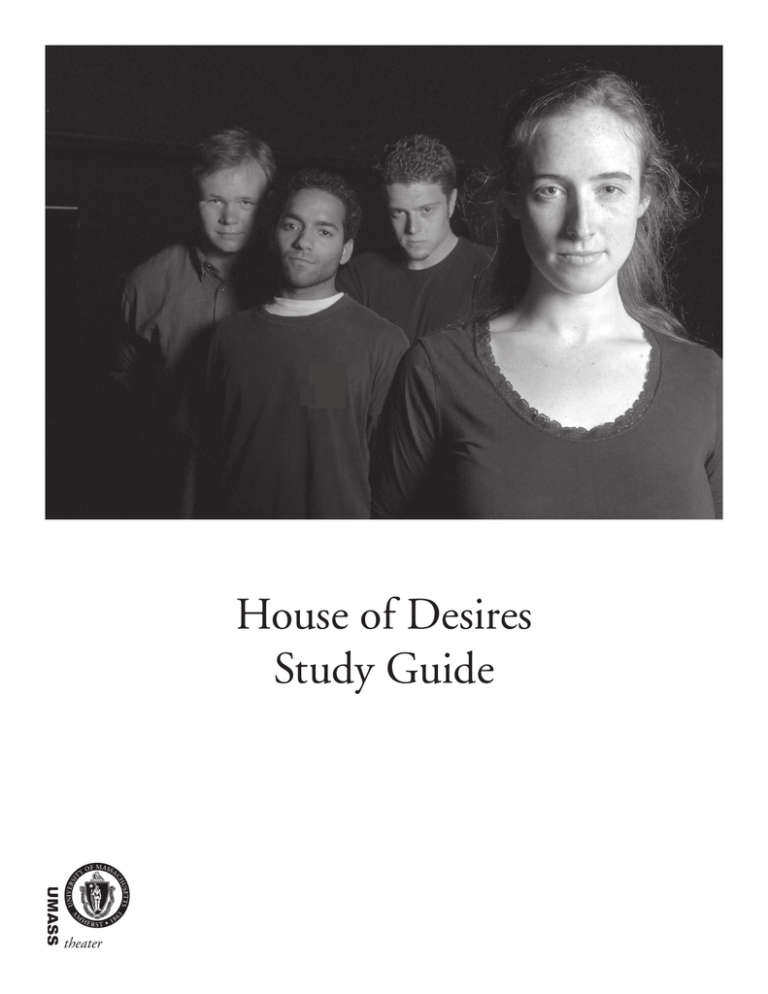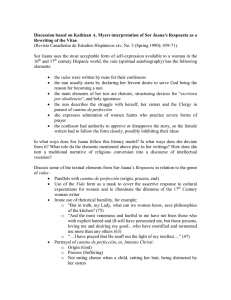House of Desires study guide
advertisement

House of Desires Study Guide UMASS theater House of Desires: Plot Synopsis The aristocratic Doña Ana explains to her maidservant, Celia, that her brother, Don Pedro, has concocted a scheme to prevent the woman he adores, Doña Leonor, from eloping with her lover. Ana explains that a few of Pedro’s associates will engage the lover in a fight, while others, under the pretense of protecting Leonor’s honor, will whisk her away to the home of Ana and Pedro. Ana then confesses that she is bored with her suitor, Don Juan, whom she once loved. Now, she loves someone new, Don Carlos. With amusement, Celia tells the audience that she has allowed the angry Don Juan into Ana’s room and that he awaits her there, to force her to explain her indifference. Pedro’s henchmen arrive with the distraught Leonor. She begs for sanctuary in Ana’s house and explains that she is of poor but noble blood and highly renowned for both her beauty and learning. She then speaks passionately about the lover with whom she tried to flee that night — who is none other than Don Carlos, Ana’s love. Ana, spurred by competitive spirit, vows that she will make Carlos hers. Believing himself to be a wanted criminal for stabbing one of the men who accosted Leonor and him on the street, Carlos unwittingly stumbles upon Ana and Pedro’s home and begs sanctuary for himself and his comical servant, Castaño. Ana, pleased, hides the pair. Meanwhile, Leonor’s father, Don Rodrigo, has learned of her absence from his manservant, Hernando, who suggests that Don Pedro, who had most ardently pursued Leonor, might be the culprit. Rodrigo determines that the only way to save his and Leonor’s honor is to make Pedro marry her at once. Back at the home of Dona Ana, the love-crazed Don Juan mistakes Leonor for Ana in the darkness, and nearly attacks her. Don Carlos hears Leonor’s cries, but Ana tries to prevent him from investigating their source. They stumble into the dark room already occupied by Leonor and Juan, where Ana recognizes Juan’s voice, Leonor recognizes Carlos’s voice, and Carlos recognizes Leonor’s voice. In the midst of this confusion, Don Pedro arrives home. Ana hides all the visitors away in different rooms and receives her brother. The next morning, Carlos tells Castaño he’s sure that Leonor is somewhere in the house. Celia asks the two men to hide, and Castaño falls in love with her. Leonor, concerned that Carlos’s presence in the house means he is having an affair with Ana, begs Ana to tell her the reason for his visit. Ana deflects the question and introduces Pedro to Leonor, who is shocked to discover that her disliked suitor is her host. In order to make Carlos doubt Leonor’s fidelity, Celia, at Ana’s bidding, makes sure that he sees Leonor sitting with Pedro during a private musical performance. Don Rodrigo arrives to convince Pedro to marry Leonor. Pedro is delighted but confused, and makes up a lie about how Leonor came into the house. Carlos overhears their conversation and is furious that Leonor is now promised to Pedro. Leonor hears as well and decides to become a nun rather than marry Pedro. Carlos plans to confess to Rodrigo that it was he who tried to elope with Leonor, but, to protect himself, orders Castaño to take a letter explaining this to Rodrigo. Scared that he’ll be picked up as Carlos’ accomplice, Castaño disguises himself as a woman in order to deliver the letter unrecognized, but before he can get out of the house Pedro mistakes him for Leonor. Trying to escape, the disguised Castaño promises to marry Pedro, who, not wanting to lose his “Leonor,” locks the disguised Castaño in a room. A swordfight between Juan and Carlos ensues, and Ana, thinking Juan to be Carlos, hides him away in her bedroom. Carlos, out of loyalty to his hostess Ana, wants to get her safely out of the room; instead, he inadvertently helps the cloaked Leonor, whom he hands over, disguised as Ana, to Rodrigo. Carlos returns to rescue Leonor, since he believes her to be still in danger. Rodrigo decides not to hand over “Ana” to her brother until he promises to marry Leonor. When all the characters find their way onto the stage at the same time, it finally becomes clear that Carlos and Leonor love only each other, that Ana has accidentally hidden Juan in her room and now must marry him, and that Pedro’s “Leonor” is in fact Castaño, who winds up happily paired with Celia. — Margaret Inners, production dramaturg Production Facts: A UMass Theater production like House of Desires typically involves undergraduate and graduate students, staff members, professors, and community members. Most of the actors are undergraduates ranging from firstyear students to seniors. Most are theater majors. The directors are usually professors or graduate students. In the case of House of Desires, the director is a secondyear graduate student. About the playwright: Sor Juana Inés de la Cruz The remarkable life of Sor Juana Inés de la Cruz began in 1648. She was born in Mexico to an army officer and the daughter of a wealthy landowner. Juana’s parents were not married, and she was raised in the town of Panoyan, where she had access to her maternal grandfather’s library. She learned to read by age three; by age six, Juana was asking to dress as a boy and attend the university in Mexico City, a request that her mother refused. Juana then took her education into her own hands, often punishing herself if she didn’t study hard enough to meet her own exacting standards. In 1659, Juana was sent to live with relatives in Mexico City. She stayed with them until 1664, when she became part of the court of Marquesa de Mancera. She began to write, both on secular and religious topics, while at court, but in 1667 she left to join the Carmelite convent of San José. Juana would stay with the Carmelites for three months, leaving because the strictness of the order caused health problems for her. In 1669, at the request of the Marquesa, she sat for an examination in front of 40 scholars who were assembled to test her knowledge. Her first biographer, the priest Diego Callega, would later write that she performed at this examination like a “royal galleon attacked by canoes.” She passed the examination with flying colors, and shortly afterwards, Sor Juana was admitted to the A painting of Sor Juana. (photo taken from http://www.dartmouth. Order of Saint Jerome, where she would remain edu/~sorjuana/) until her death. Though she was cloistered, she was still able to receive visitors, including the Marquesa. She had a two-story home within the convent, and was allowed to collect books, musical and scientific instruments, and retain servants. Most importantly, convent life allowed her ample quiet time to pursue her studies and her writing of poetry, drama, and religious works. House of Desires was first performed in 1683. In 1690, Sor Juana wrote a critique called “Letter Worthy of Athena” of a famous sermon. The piece was never intended for publication, but Sor Juana sent it to a friend, Manuel Fernandez de Santa Cruz, the bishop of Puebla, at his request. He betrayed her trust by publishing the piece, and followed it with the publication of his own “corrective” treatise, which he claimed was written by “Sor Filotea.” One of her most famous pieces was the “Response to Sor Filotea de la Cruz,” wherein Sor Juana defended the right of women to be educated. Her “Response” drew great hostility from church authorities. In 1693, Sor Juana renounced her secular intellectual life, selling all of her books and musical instruments. Religious authorities attributed her sudden change of heart to “divine intervention,” but it is also possible that she simply could no longer withstand the constant assault from church officials, and gave in to their wishes. In 1694, she signed a renewed declaration of her faith in her own blood, also vowing to give up all secular studies. She died not long after, tending to her fellow sisters during a plague that swept through Mexico City in 1695. — Lauryn Sasso Exercise: The challenge of translation There is much more to translating a play than simply finding matching English words for the ones in the original language. Translators have to make many decisions about how, exactly, to approach the text they are working with. Questions to consider include: Should they translate word for word? What about expressions in the original language that don’t exist in the other language — should they substitute a different expression that conveys the same idea, or simply rely on the audience catching on? What about the customs and beliefs reflected in the play that are foreign to the new audience — should some explanation be offered? If the play was written a long time ago, should the translation reflect the language of long ago or should it be in contemporary terms? These questions and more are on the minds of translators as they work. Below are three versions of the same section of the play - one in the original Spanish, and two translations. Read them over (if you do not speak Spanish, just read the two English versions). What are the similarities? What are the differences? What choices do you think the two translators made in their work? Do you agree with them? If you know Spanish, try your own translation — what decisions did you find yourself making as you worked? Original Text, from Los Empeños de una Casa Si de Carlos la gala y bizarría pudo por sí mover a mi cuidado, ¿cómo parecerá, siendo enviado, lo que sólo por sí bien parecía? Si sin triunfo rendirle pretendía, sabiendo ya que vive enamorado ¿qué victoria será verle apartado de quien antes por suyo le tenía? Pues perdone Don Juan, que aunque yo quiera pagar su amor, que a olvido ya condeno, ¿cómo podré si ya en mi pena fiera introducen los cellos su veneno? Que es Carlos más galán; y aunque no fuera, tiene de más galán el ser ajeno. Translation #1, from The House of Trials, tr. David Pasto Translation #2, from House of Desires, tr. Catherine Boyle Since the grace and gallantry of Carlos had enough power to make me love him, how will they appear now that jealousy adds to the attraction? If I tried in vain to win his love, knowing that he loves another, what would I gain by keeping him apart from his first love? Pardon me, Don Juan. Although I want to return your love and condemn my neglect, how could I, now that jealousy has thrust its poison into my suffering? Carlos is the most handsome suitor, but his suit belongs to another. If Carlos’s gallant splendour could by itself move me to care, does not envy enhance beyond measure all that naturally made him so fair? If I thought to win him without fighting, now that I know he’s in love, won’t victory be much more exciting when he’s parted from his sweet precious dove? So, forgive me Don Juan, though it may be more sane to repay your love, which I now condemn to oblivion, how can I do so, when into my fierce pain jealousy has injected its poison? Carlos is more gallant, but if that were not so, that he belongs to another makes him irresistible. Cultural Context To understand this production, it helps to know more about the cultural context in which Sor Juana was writing, as well as about some of the theatrical conventions of the day. Code of Honor Much day-to-day life in Golden Age Spain and Mexico was ruled by intricate social behaviors and strict prohibitions. Knowing this, it will be easier for you to understand certain characters’ motivations and concerns in House of Desires. Under the Code of Honor, a man’s loss of his honor, whether through cowardice or failing to exact revenge for an insult, was deemed worse than death. Another aspect of the Code of Honor involved chaperoning: an unmarried woman could not be alone in a room with a man who was not her husband or relative. If she were, she would either need to marry the man, join a convent, or watch the man being killed at the hands of her nearest male relative. Social Hierarchy and Asides Juana makes frequent use of a Racial Situation in Sor dramatic convention known as an Mexico aside throughout House of Desires. A very defined social hierarchy characterized life in Mexico in the 17th century. The Spanish were at the top of the pyramid and jealously guarded their power and prestige. The Criollos, people of Spanish descent born in Mexico, frequently enjoyed great wealth, but were always extremely conscious that the Spanish looked down upon them. The Mestizos, people of mixed Spanish and native ancestry, inhabited an uncomfortable gray area in Mexican society: they were neither accepted by the Spanish and Criollos, nor by the native peoples. Finally, the native peoples of what came to be called Mexico lived in both nomadic and sedentary cultures, which were slowly wiped out as the Spanish zealously pushed their Christian agenda throughout the country. An aside is an actor’s speech directed to the audience but supposedly not heard by other characters; he may actually step aside from the action to address the audience or simply turn his head briefly to comment on his plans or emotions. Asides in House of Desires are used to humorous effect in that they reveal how wrong many characters’ perceptions of their situations are, or can emphasize the differences between their social personalities and their true selves, and between their apparent and actual motivations. —Margaret Inners Discussion Questions Do you think our society has a Code of Honor? What is it? How do you feel about the Code of Honor of the world of the play? Do you see any part of this code that survives in our culture today? Do you think it is viable in our day and age? What do you think of woman’s role in the Code? If it pertained to you, would you be comfortable marrying someone just because you had been alone in a room with him? How would you feel about your male relatives killing someone because of you? If you had to choose one of these two options, which one would you choose, and why? How do you think 17th century Mexico’s social hierarchy compares to that of our society? How do you think this hierarchy affects the plot of the play? Costume facts The costumes for House of Desires are partly “built” and partly “pulled.” “Built,” means we created them just for this play. “Pulled” refers to costumes we had in storage that we are using in this play. Pulling a costume is cheaper and takes less work than building one. It is a good money-saving measure in a show like House of Desires, which has a large cast. The costume designer drove a total of 580 miles to collect and fabric and trim for this show. Costano’s disguise costume contains 18 yards of fabric and 54 yards of trim. This drawing and those on the following page were created by costume designer June Gaeke to show what the character’s costumes would look like. Doña Ana Costume Design for House of Desires On several fronts, the costumes help the audience to buy into a theatrical plausibility that does not have a strong footing in reality. For instance, the servants, Cecilia and Costaño, are much more astute about life and the happenings in the household than their noble masters, who constantly make poor choices and therefore constantly complicate their lives. To support the wise servant idea, those two characters have a color intensity in their clothing that reinforces their strong characterization. Another divergence from reality includes the actor who plays Costaño fitting into Dona Leonor’s clothing to disguise himself. The audience is asked to accept this disconnect and play along with the fun. In addition, Dona Ana wears her character’s intentions as a design in the form of a spider on the front of her costume, which has no basis in costume history and is pure design fantasy. —June Gaeke, costume designer Don Juan Don Pedro Directing House of Desires As director of House of Desires, I have looked into this wonderful comedy by Sor Juana Inés de la Cruz and found a rich bed of human foibles. She has written about the deceptions we practice on others and ourselves. Throughout this play, Sor Juana delves into the light and dark of our lives, the truth and hidden meanings, what we fear and what those few of us dare to discover. The tangled webs of lies woven by some for their own gain dissolve in the glow of the heart that beats true. This performance creates a world where we who watch know that what we see is just a play. However, the vitality of the performance engulfs us in the merriment. We watch as observers and as participants at the same time. This is Sor Juana’s genius. —Keith Langsdale, director Production Facts: The set is designed to give the illusion of a spider web. The female actors had to start wearing corsets in midOctober in order to start getting used to them and the feel of their costumes. The actors practice their sword fight every night prior to performing so that it is like second nature to them. This helps ensure everyone’s safety. House of Desires Study Guide Created by Margaret Inners, Lauryn Sasso and Anna-Maria Goossens Edited by Patricia Warner and Anna-Maria Goossens Attending a performance — the role of the audience In some ways, going to a theater performance feels like going to a movie. After all, just as in a movie, you, the audience member, sit in a darkened theater and watch the action unfold in front of you as a group of actors bring written words to life. However, there’s one huge difference. In a movie, everyone involved in the production finished their work months ago. What’s on the film is there to stay. For better or for worse, no matter how many times you watch it, the film will always be the same. In contrast, one of the things people love about theater is that it’s rarely ever the same. Any number of things, good and bad, can make a work change from night to night: The actor’s understanding of his or her role deepens and changes; a light or sound cue might come in at the wrong time; something that happened offstage might affect the way two actors relate to each other in either a good or a bad way. One of the biggest variables is the audience. A bad audience can throw actors off and make for a bad performance, whereas an engaged and respectful audience can help boost the actors’ energy and raise the level of the play. There are a few things you can do to make a performance better for you and for the actors. 1. Open your mind. If you’re unsure whether you’ll like this play, or theater in general, give it a chance. Having new experiences is part of broadening your horizons, so sit back and let the story and the experience unfold — and enjoy it! 2. Please react — respectfully. Actors love an audience that is attentive and reacting to what happens onstage; it can really boost the energy of a performance. Laugh when something funny happens, cry when something touches you, and clap if you’re impressed. But if you are annoyed with a character or you think an actor’s performance is terrible, please do not yell at the stage. You could wreck an actor’s concentration and ruin the show. 3. Cell phones and pagers should always be turned off during a show. Nothing is worse for actors and audiences alike than to be in the midst of a moving scene and to hear that annoying beeping. 4. And finally, even if you think it’s the worst thing you’ve ever seen, please keep in mind that the people onstage poured their heart and soul into this production, and that there are many others in the audience who completely disagree with you. Please remain respectful. Do not talk, try not to fidget, and unless it’s a medical emergency, please do not leave your seat until intermission or the end of the play. —Anna-Maria Goossens


